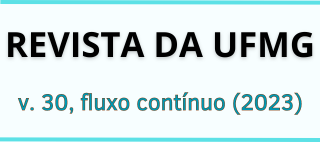Algorithmic sexism and racism
an intersectional look at neomaterialism through Midjourney
DOI:
https://doi.org/10.35699/2965-6931.2023.47587Keywords:
intersectionality, midjourney, neomaterialism, algorithmic racism, sexismAbstract
Based on discussions by André Lemos (2020, 2021) and José Luiz Braga (2020) on neomaterialism, the article seeks to bring an intersectional approach around digital culture, focusing on race and gender. The theoretical framework explores neomaterialism and anthropocentrism, the relevance of algorithms, racism and sexism in databases and algorithmic racism. The article brings the questions: what does an object do after it has been made? Which bodies are most reproduced by algorithms? What do people seek to create with artificial intelligence? In the methodology, an analysis of images generated with the artificial intelligence developed by Midjourney, an American startup, is carried out, observing the content of the images and the descriptions used by the users for their creation. As a result, there is a large presence of white and female bodies and the descriptions request young women, with sensual clothes and poses.
Downloads
References
BRAGA, José Luiz. Neomaterialismo & Antropológicas. Revista Galáxia, São Paulo, 2020, n. 45, set-dez, p.20-33. Disponível em: https://www.scielo.br/j/gal/a/dhB9X7k7p9gq7xDCdtXQpVc/?lang=pt. Acesso em: 30 jun. 2023.
CARRERA, Fernanda. Racismo e sexismo em bancos de imagens digitais: análise de resultados de busca e atribuição de relevância na dimensão financeira/profissional. In: SILVA, Tarcízio (org.). Comunidades, Algoritmos e Ativismos Digitais: Olhares Afrodiaspóricos. São Paulo: Editora LiteraRUA, 2021, ed. 2, p 147-165. Disponível em: https://www.researchgate.net/publication/339954112_Comunidades_Algoritmos_e_Ativismos_Digitais_olhares_afrodiasporicos. Acesso em: 30 jun. 2023.
CORRÊA, Laura Guimarães. BERNARDES, Mayra. “Quem tem um não tem nenhum”: solidão e sub-representação de pessoas negras na mídia brasileira. In: CORRÊA, Laura Guimarães (org.). Vozes Negras em Comunicação: Mídia, racismos, resistências. Belo Horizonte: Autêntica, 2020. v.1, p.203-220.
CORRÊA, Laura Guimarães. Interseccionalidade: um desafio para os Estudos Culturais na década de 2020. In: SANTOS, L. H. S; KARNOPP, L. B; WORTMANN, M. L. O que são estudos culturais hoje? Diferentes praticantes retomam a pergunta do International Journal of Cultural Studies. São Paulo: Pimenta Cultural, 2022. p.123-141. Disponível em: https://www.lume.ufrgs.br/bitstream/handle/10183/253452/001159493.pdf?sequence=1. Acesso em: 30 jun. 2023.
DANTAS, Ricardo. O que é Midjourney AI e como funciona? Teg6, 15 mai. 2023. Disponível em: https://teg6.com/106991/noticias/o-que-e-midjourney-ai-e-como-funciona/>. Acesso em: 8 jul. 2023.
GILLESPIE, Tarleton. A relevância dos algoritmos. Revista Parágrafo, 2018, v. 6, n. 1, p. 95-121. Disponível em: http://revistaseletronicas.fiamfaam.br/index.php/recicofi/article/view/722/563. Acesso em: 30 jun. 2023.
HALL, Stuart. Cultura e Representação. Rio de Janeiro: Ed. PUC-Rio: Apicuri, 2016. p. 139-223.
LEMOS, André; BITENCOURT, Elias. Sete pontos para compreender o neomaterialismo. Revista Galáxia, São Paulo, 2021, n. 46, p. 1–10. Disponível em: https://revistas.pucsp.br/index.php/galaxia/article/view/52017. Acesso em: 30 jun. 2023.
LEMOS, André. Epistemologia da comunicação, neomaterialismo e cultura digital. Revista Galáxia, São Paulo, 2020, n. 43, jan-abr, p. 54-66 Disponível em: https://www.scielo.br/j/gal/a/DvNQBjKxf4hBZf3cQHBL5FL/?lang=pt. Acesso em: 30 jun. 2023.
MARQUES, Ana. VINHA, Felipe. O que é Discord? Conheça funções, planos e dicas de segurança. Tecnoblog, 2020. Disponível em: https://tecnoblog.net/responde/o-que-e-discord/. Acesso em: 8 jun. 2023.
MIDJOURNEY, programa por trás de imagens falsas que viralizaram, suspende testes gratuitos. Revista Pequenas Empresas, Grandes Negócios (PEGN), 30 mar. 2023. Disponível em: https://revistapegn.globo.com/tecnologia/noticia/2023/03/midjourney-suspende-testes-gratuitos-apos-imagens-falsas-viralizarem.ghtml. Acesso em: 8 jun. 2023.
SALKOWITZ, Rob. Midjourney Founder David Holz On The Impact Of AI On Art, Imagination And The Creative Economy. Forbes, 16 sep. 2022. Disponível em: https://www.forbes.com/sites/robsalkowitz/2022/09/16/midjourney-founder-david-holz-on-the-impact-of-ai-on-art-imagination-and-the-creative-economy/?sh=1011152d2d2b. Acesso em: 8 jun. 2023.
SILVA, Tarcízio. Racismo Algorítmico em Plataformas Digitais: microagressões e discriminação em código. In: SILVA, Tarcízio (org.). Comunidades, Algoritmos e Ativismos Digitais: Olhares Afrodiaspóricos. São Paulo: Editora LiteraRUA, 2021, ed. 2, p 127-145. Disponível em: https://www.researchgate.net/publication/339954112_Comunidades_Algoritmos_e_Ativismos_Digitais_olhares_afrodiasporicos. Acesso em: 30 jun. 2023.
STANLEY-BECKER, Isaac. HARWELL, Drew. Conheça a Midjourney, startup de IA por trás das imagens falsas do Papa Francisco e de Donald Trump. Byte, 17 abr. 2023. Disponível em: https://www.terra.com.br/byte/conheca-a-midjourney-startup-de-ia-por-tras-das-imagens-falsas-do-papa-francisco-e-de-donald-trump,07a5b975700c143874185b8d8c4a524edat74ecu.html. Acesso em: 8 jun. 2023.




